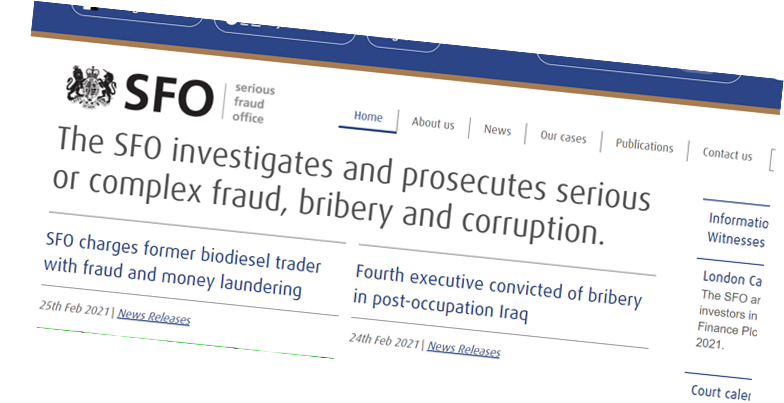UK’s SFO slapped down over attempts to flout jurisdiction rules

In another blow to the agency’s credibility, the U.K.’s Serious Fraud Office (SFO) cannot attempt to force foreign companies to hand over evidence held overseas, according to a recent court ruling.
The U.K.’s Supreme Court ruled unanimously the SFO breached its authority when it attempted to compel U.S. engineering services company KBR—whose British subsidiary is under investigation for possible bribery and corruption offenses—to supply documents held outside the United Kingdom or face criminal sanction.
Lawyers criticize what they see as another example of the SFO’s heavy-handedness to secure results—in this case by trying to use powers it never had in the first place.
“Why would any company with deep pockets bother to cooperate with any SFO investigation from now on? Companies already have to jump through hoops to even be considered for a deferred prosecution agreement, which entails turning over all their evidence so the SFO can go after individuals. If this judgment has taught large companies anything, it is to dig in and fight.” – Francesca Titus, Partner, McGuireWoods
“Enforcers such as the SFO should not be pushing at their limits in this way,” says John Binns, lead partner in the financial crime team at law firm BCL Solicitors. “This is another example in an increasingly long line of cases that demonstrate the SFO’s reach exceeds its grasp.”
In 2017, the SFO announced it had launched an investigation into the U.K. arm of KBR. The subsidiary agreed to cooperate and provided the SFO with documents held in the United Kingdom. Company employees had also flown from the United States to the United Kingdom to help with inquiries.
However, the SFO then attempted to force the U.S. parent company to hand over documents held outside of the United Kingdom using Section 2(3) of the Criminal Justice Act 1987 (known as a “Section 2 notice”). Failure to comply is a criminal offense.
KBR applied for judicial review to quash the notice over concerns the agency was exceeding its powers by being overtly extraterritorial when it had no jurisdiction to do so.
Initially, in 2018, the High Court ruled in the SFO’s favor. KBR then appealed to the Supreme Court, which last week unanimously rejected the earlier decision on the grounds Section 2 notices were not intended to give the SFO the power to strong-arm a foreign company to produce documents it holds outside the U.K. The notices contain no express wording about extraterritoriality and therefore cannot be validly served on a foreign company with no fixed place of business in the United Kingdom.
Instead, said the five judges, the SFO should have sought to request mutual legal assistance from U.S. authorities—as it has the power to do—to obtain the necessary documents. Lawyers say that process can be lengthy, but it is not unduly onerous, and add the United States would be unlikely to refuse a request for evidence from the United Kingdom.
Bambos Tsiattalou, specialist financial crime lawyer at law firm Stokoe Partnership Solicitors, says the Supreme Court “quite rightly ruled against the SFO given the agency would have no legal authority in the jurisdiction in which the documents were held and would also have no jurisdiction over the foreign registered company.”
David Savage, partner and head of financial crime at U.K. law firm Stewarts, says that “the Supreme Court has demonstrated it is not willing to infer extraterritoriality into powers granted by statute. This finding will be welcomed by both the legal and international business communities.”
Francesca Titus, partner in white collar crime at law firm McGuireWoods, says the SFO’s use of a Section 2 notice was a “flagrant attempt” to “circumvent the safeguards” built into the mutual legal assistance regime fundamental to upholding respect between states and comity.
“This judgment is a victory for common sense,” she says. “It should remind the SFO it needs to play by the rules, work within the law, and stop these antagonistic actions.”
Titus says there has been a pattern over the last few years of increasingly aggressive use of such notices by the SFO, even though the agency’s own handbook—which spells out its approach and priorities—notes Section 2 powers are inherently intrusive and should only be used when it is necessary, reasonable, and proportionate.
“It is bizarre the SFO chose to issue such a notice on witnesses who had voluntarily flown to the U.K. to cooperate, rather than use the correct mutual legal assistance route to obtain the evidence,” says Titus.
Lawyers believe the judgment could significantly alter how the SFO conducts extraterritorial investigations from now on, with some adding companies will be more likely to try their luck in the courtroom than seek leniency with the agency through cooperation. Some also believe there are bound to be questions over SFO Director Lisa Osofsky’s leadership.
“Why would any company with deep pockets bother to cooperate with any SFO investigation from now on?” says Titus. “Companies already have to jump through hoops to even be considered for a deferred prosecution agreement, which entails turning over all their evidence so the SFO can go after individuals. If this judgment has taught large companies anything, it is to dig in and fight.”
In a written statement, an SFO spokesperson said: “Section 2 powers are fundamental to our ability to conduct our investigations, which often involve international companies with complex corporate structures.
“We welcome the Supreme Court’s clarification of the extent of the SFO’s powers in this matter, including its confirmation of our power to compel U.K. companies to repatriate documents which they hold overseas.”
According to the SFO’s Website, its investigation into KBR for possible bribery and corruption offenses is still ongoing (though lawyers suspect the case will soon close).
Article credit: https://www.complianceweek.com/regulatory-policy/uks-sfo-slapped-down-over-attempts-to-flout-jurisdiction-rules/30023.article
